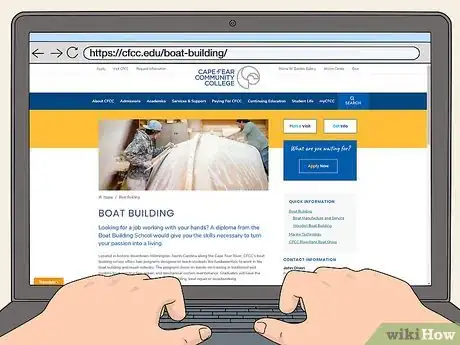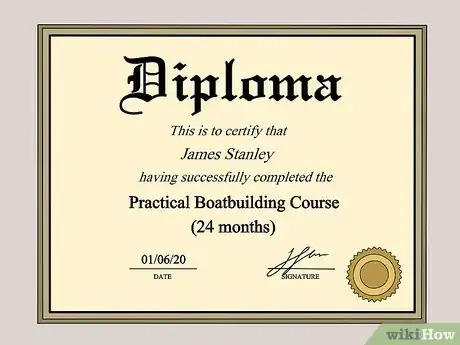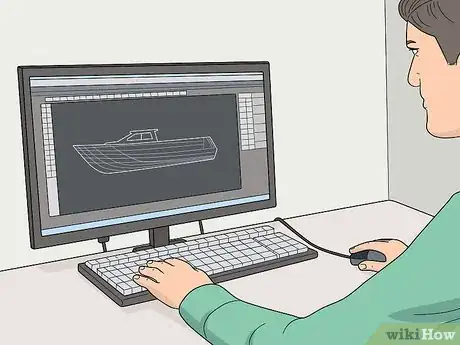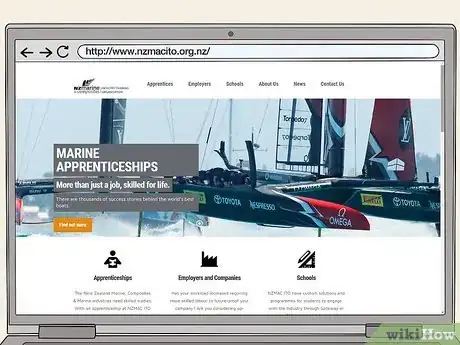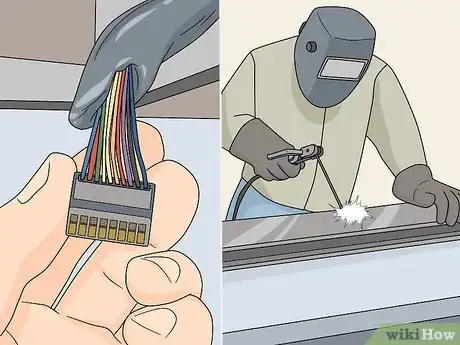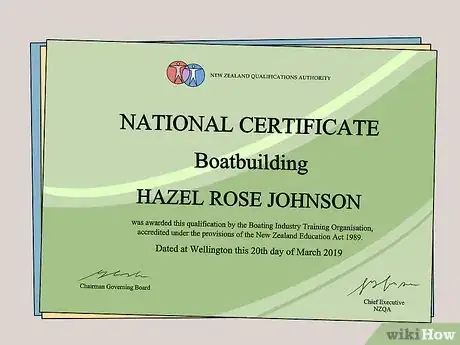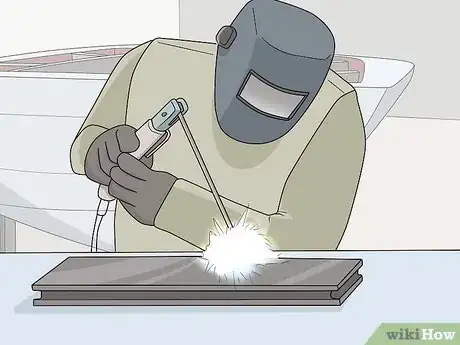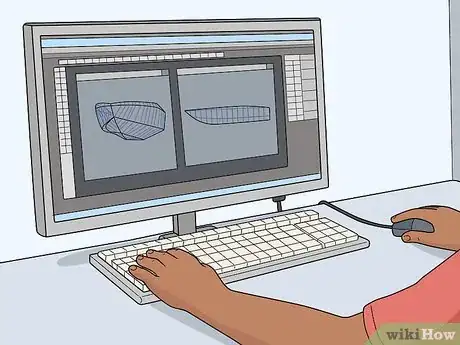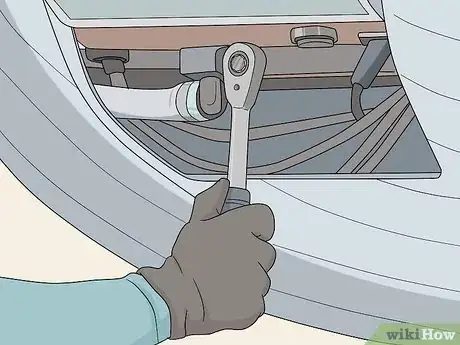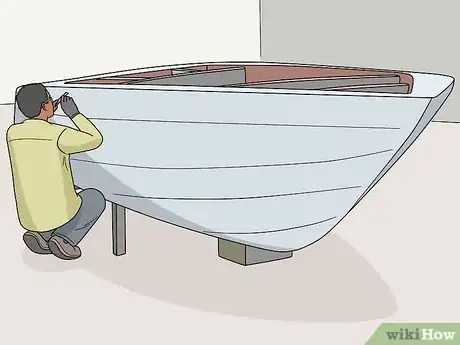This article was co-authored by wikiHow Staff. Our trained team of editors and researchers validate articles for accuracy and comprehensiveness. wikiHow's Content Management Team carefully monitors the work from our editorial staff to ensure that each article is backed by trusted research and meets our high quality standards.
There are 8 references cited in this article, which can be found at the bottom of the page.
This article has been viewed 13,495 times.
Learn more...
Boat builders are responsible for designing and assembling watercraft that can hold up to harsh conditions out on the water. This includes anything from small fishing boats to ornate superyachts fit with the most elaborate features available. There are no specific educational requirements necessary, but most boat builders attend a 1-year study program before entering an apprenticeship. Plenty of successful builders have first-hand experience from operating or working on boats and may go on to making custom designs. If you’re a creative person that likes working with your hands, boat building could be the perfect job for you!
Steps
Getting a Building Degree
-
1Take math and science classes to prepare you for construction work. Although boat building doesn’t have any specific educational requirements, there are a few subjects you can study to prepare for work. Engineering classes are very useful for designing and building things from raw materials. Algebra, geometry, and physics are also very important for determining how to build something that holds up against water.[1]
- Start taking any relevant classes while you’re in high school. If engineering or physics classes aren’t available, consider reading about them on your own until you enter a training or apprenticeship program.
- Communications classes are also helpful since building involves a lot of teamwork, especially if you’re a lead builder. Business classes are also worth taking if you plan on running a company or selling your own boats.
-
2Apply to a college that teaches boat building. Check with schools near you to see what kinds of courses they have available. There are some schools that focus specifically on boat building. Some community colleges offer broader degree programs meant to prepare you for work in the boat building industry. If you’re able to get an education from either of these sources, you will have a better shot of finding employment.[2]
- Having a high school diploma or GED helps, but it usually is not required to take classes.
Advertisement -
3Earn an undergraduate degree in 1-2 years. The average boat building program only lasts for a year. Some schools offer an optional second year of study for students that want to pursue an associate’s degree. It depends on what options are available, but the additional year of study teaches you a lot more about the intricacies of building quality boats. These programs teach you about the manufacturing process and some of the science and math that goes into it.[3]
- Boat building programs can be hard to find even if you live near water. Anticipate needing to travel in order to attend classes.
- Be sure to check the course offerings each college has. Some of them have programs for fiberglass and composite boats and a separate one for wooden boats.
- Speak with the school’s academic advisor to ensure you take the right classes. They will also help transition you to an apprenticeship or employment after you graduate.
-
4Complete a 4-year naval architecture degree if you plan on designing boats. Boat builders assemble boats, but architects design them from scratch. Because of all the rules and regulations that go into making safe boats, these programs take longer to complete than regular boat building courses. A good degree program includes classes on subjects like engineering, physics, calculus, and programming. It enables you to build something safe and seaworthy no matter what type of boat you want to build.[4]
- Although degree programs focus on designing safe boats, you will still have plenty of opportunities to contribute to the construction process.
-
5Get a 4-year degree in marine engineering to design a wide variety of boats. Marine engineers build everything from small rowboats to giant passenger ships and carriers. They work with naval architects to bring ship blueprints to life. The job requires a 4-year degree in marine engineering, along with work experience and government licensing. If you’re interested in working with the military or designing a specific type of watercraft, marine engineering may be right for you.[5]
- Some engineers work on sea structures like offshore platforms and drilling equipment. An engineer has to have a good understanding of naval design to ensure these structures are safe.
- Engineers have an advanced education in math, science, and drafting. Calculus and physics are a couple of important subjects required for the work.[6]
-
6Contact boat building companies to apply for work. Locate any boat building companies in your area that are looking for new hires. You can usually find some through a quick search online for something like “boat building jobs.” Fill out an application online or in person. Include your resume, listing your educational background and any relevant building experience you happen to have.[7]
- Look for any events where boat building companies will be present. Some places have tall ships on display, for instance, while others host volunteer events for people who want to help restore boats.
- Call different builders to ask about their employment opportunities if you aren’t satisfied by what you see online. Your school can also help link you to different companies.
Working through an Apprenticeship
-
1Apply to boat building companies for apprenticeship opportunities. Search for different boat building companies and note any of them that have openings for new workers. Many companies train aspiring boat builders and hire them full-time afterward. You don’t have to pay for the training and still receive a paycheck for the work you do, so it is a good option if you’re unable to study for a degree. These positions can fill up quickly, so don’t be discouraged if you are unable get one right away.[8]
- Applying for an apprenticeship is the same as applying for a regular position with a building company. Many companies have online applications, but you could also call or visit them in person to apply.
- Even people who have no formal education or training are eligible for apprenticeships. However, having an educational background increases your chances of getting hired.
-
2Finish the apprenticeship after 4 years. During your apprenticeship, you work under a senior boat builder. They are responsible for training you on how to build quality watercraft. You may start out helping the builder with simple tasks like moving supplies and cleaning up. Eventually, you learn to operate machinery and join materials together to form a boat’s frame.[9]
- Note that, if you have a strong background in construction skills, you may be able to speed through or skip the apprenticeship. It’s very rare, though.
-
3Train for specialty work if you want a specific role in building. Boats are made through the combined efforts of builders with many different types of skills. In a company, it isn’t unusual for some workers to handle different parts of the building process than others. One group may take care of the welding, for instance, while another handles the upholstery, electrical wiring, and so on. If you like a specific role more than the others, consider studying it and practicing it to become an expert.[10]
- The boat company you work for may offer additional training for specialty positions.
-
4Acquire any certifications necessary to work as a boat builder. Boat builders usually do not need any sort of license, but some areas may require you to get certificates. These certificates are meant to show that you went through the proper schooling and apprenticeship to become a boat builder. Certification depends on where you live, so check local regulations for more information.[11]
- For example, if you live in New Zealand or Australia, you may have to get a certificate in boat building, marine coatings, interiors, or another subject, depending on your specialty.
- Certificates are usually given out after you complete an apprenticeship. Speak with an academic advisor or your country’s maritime office to learn about certification.
Getting Practical Experience on Your Own
-
1Study welding and other trades to improve your construction skills. Learning skills can help you get hired as a boat builder even if you don’t have much experience with boats. Welding is always a useful skill to have since many modern boats are made by securing metal together. Getting experience in joinery, or joining pieces of wood together, is a good skill to have if you’re interested in wooden boats. Some other skills to study include engineering, plumbing, electrical, and restoration work.[12]
- If you can’t find a boat building course to take, try attending a technical school first to master something like welding.
- Employers are more likely to hire you if you have trade skills. Although boat building experience is preferable, employers can always train you as needed.
- These skills can be practiced on land, whether you’re building houses or repairing vehicles. Even if you don’t have much experience with boats, these skills transfer fairly seamlessly to boat construction.
-
2Learn computer-assisted design (CAD) software if you’re interested in boat design. While some companies still use paper and pencil, the vast majority of them design blueprints through CAD. You can use a program like AutoCAD to design boats on a computer. These programs can be tricky to master, so consider gaining experience before you’re ready for professional work. If you are able to get used to CAD programs, you can get a better idea of how well-built boats are made and even advance to design work.[13]
- Many technical schools offer classes on CAD. Look into some of them if you think you might like making your own blueprints.
- Look for free online classes and tutorials that can help you get accustomed to using free CAD software.
-
3Spend time sailing to teach yourself how boats work. Being a builder means knowing boats inside and out. The best way to gain experience is to spend time near the water. If you are able to, ride on boats as often as you can and even try steering your own. Use your time out on the water to get used to the various parts of a boat, how they work, and what you need to do to repair them in an emergency.[14]
- Boat building companies often look for candidates with experience. Even if you don’t have a formal education, you may be able to get on-the-job training just because you have been out to sea before.
-
4Work on boats to gain more direct experience in boat maintenance. When it comes to boats, there are many different roles you can take on without being directly involved in the building process. Try going down to your local dock or marina in search of opportunities. Some builders start out by cleaning boats or working as a deckhand. Others learn to captain private boats.[15]
- Being around boats allows you learn more about them. You will be able to see how boats work and what goes into repairs and maintenance.
- Be on the lookout for volunteer opportunities as well. Sailing associations sometimes hire volunteer crews to take care of chores, for instance.
-
5Build your own boat from scratch for a challenge. There is no better way to improve as a boat builder than by getting your hands dirty. Building a boat at home is difficult but very rewarding. It requires plenty of space and money, so it isn’t for everyone. However, you can successfully construct a small boat and take it out on the water.[16]
- Most homemade boats are built from wood, so design and joinery skills help a lot. Other skills, like welding, can come in handy if you plan on using metal.
- Homemade boats tend to be small but reliable. If you are able to do this, you can learn a lot about boat design. It makes employers more likely to hire you.
References
- ↑ https://www.careers.govt.nz/jobs-database/manufacturing/manufacturing/boat-builder/
- ↑ https://www.careers.govt.nz/jobs-database/manufacturing/manufacturing/boat-builder/
- ↑ https://nationalcareers.service.gov.uk/job-profiles/boat-builder
- ↑ https://occupationoutlook.mbie.govt.nz/manufacturing-and-technology/boat-builders-and-designers/
- ↑ https://www.bls.gov/ooh/architecture-and-engineering/marine-engineers-and-naval-architects.htm#tab-2
- ↑ https://www.bls.gov/ooh/architecture-and-engineering/marine-engineers-and-naval-architects.htm#tab-4
- ↑ https://www.theguardian.com/money/2015/may/12/how-become-superyacht-builder
- ↑ https://occupationoutlook.mbie.govt.nz/manufacturing-and-technology/boat-builders-and-designers/
- ↑ https://occupationoutlook.mbie.govt.nz/manufacturing-and-technology/boat-builders-and-designers/
- ↑ https://www.careers.govt.nz/jobs-database/manufacturing/manufacturing/boat-builder/
- ↑ https://www.careers.govt.nz/jobs-database/manufacturing/manufacturing/boat-builder/
- ↑ https://www.theguardian.com/money/2015/may/12/how-become-superyacht-builder
- ↑ https://www.engineersrule.com/shipbuilding-sets-sail-cad/
- ↑ https://paw.princeton.edu/article/rob-buchanan-81-educator-activist-boat-builder
- ↑ https://www.theguardian.com/money/2015/may/12/how-become-superyacht-builder
- ↑ https://paw.princeton.edu/article/rob-buchanan-81-educator-activist-boat-builder

